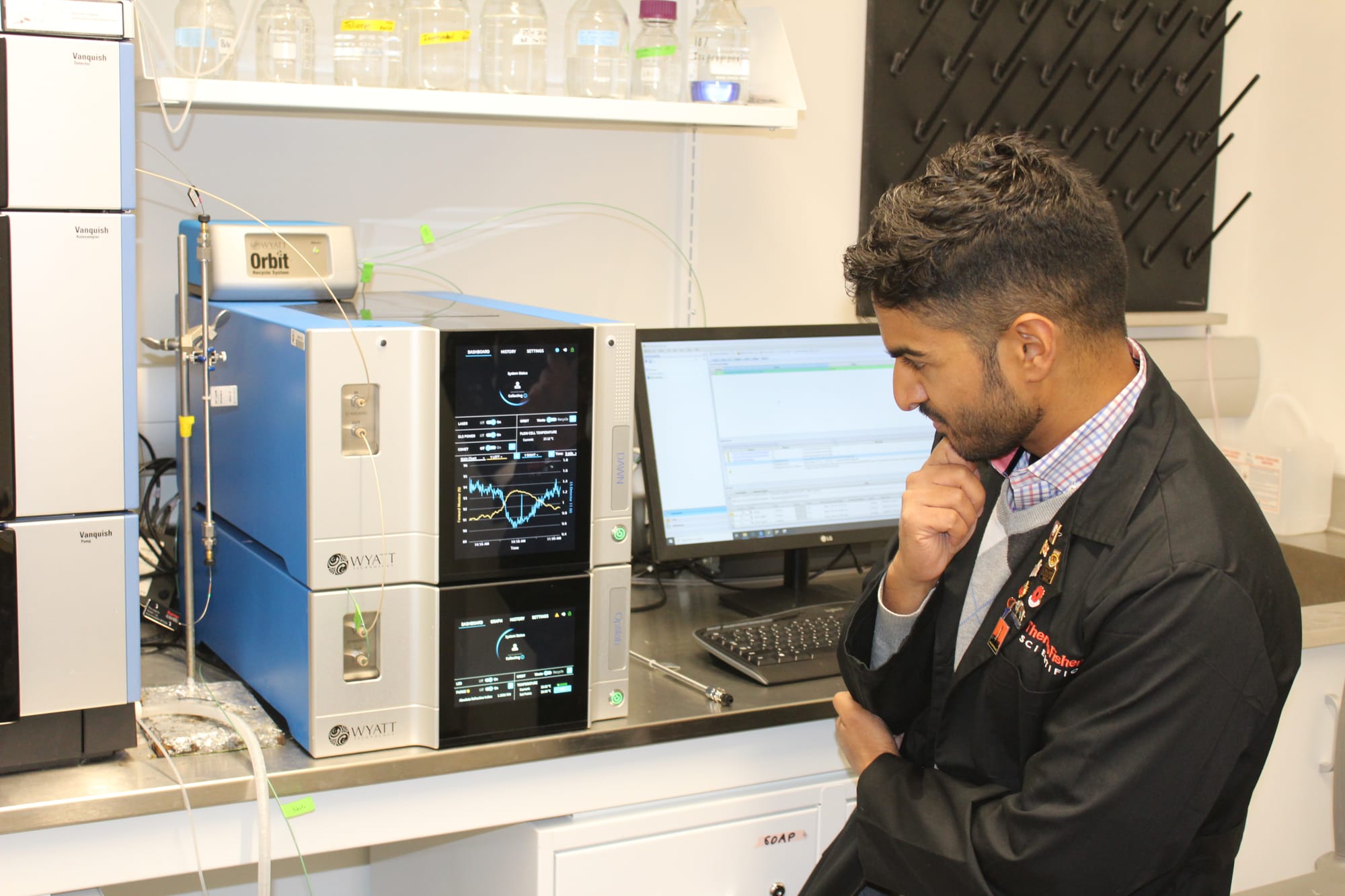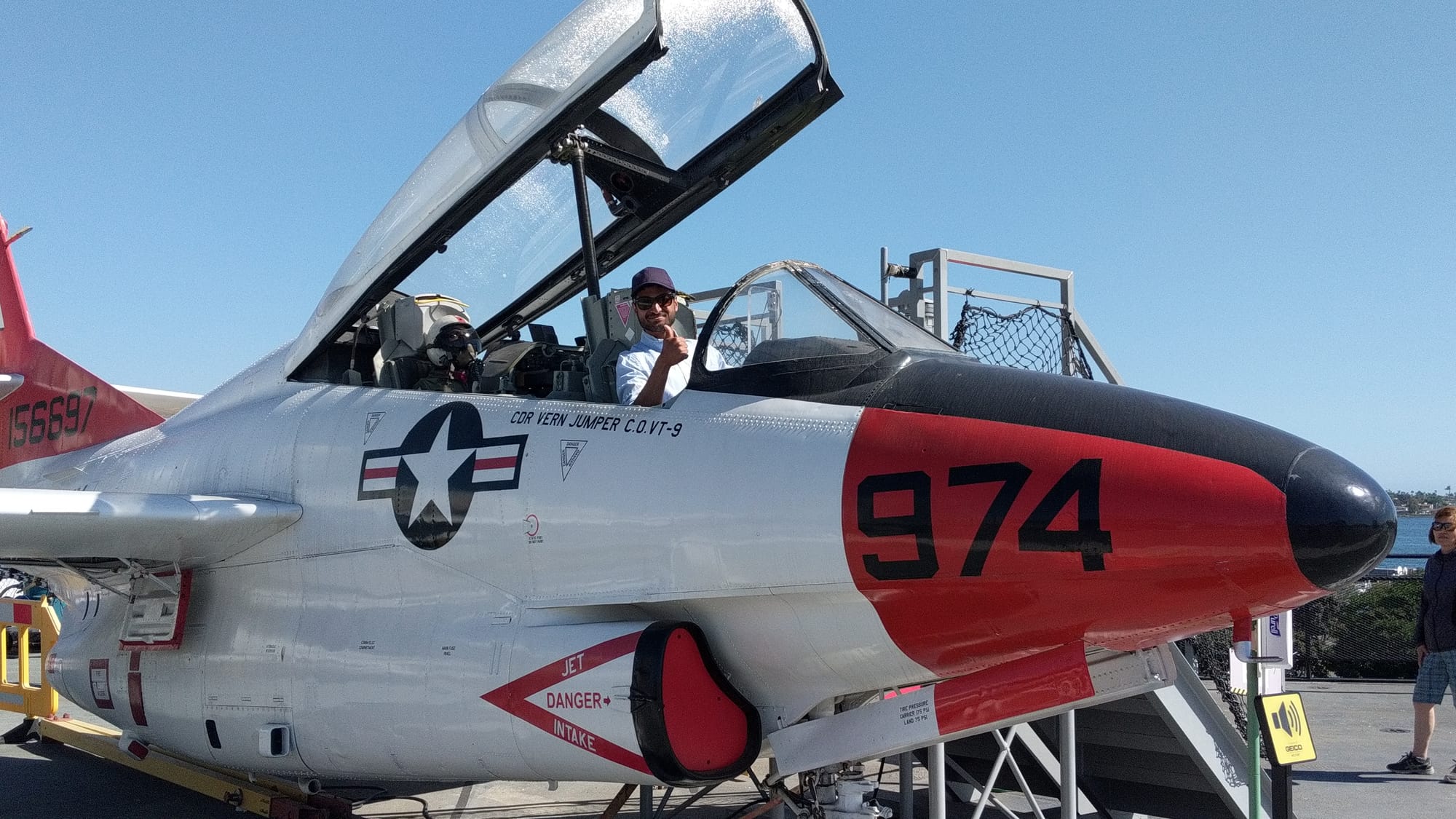Michael D'Souza (MSc '22), a PhD candidate in Biomolecular Science, chose ULethbridge for its unique focus on viral research and the collaborative, supportive environment of the Laboratory of Medicinal Biophysics under Dr. Trushar Patel. His research bridges biophysics, biochemistry, and biodefense, with a goal to understand viral RNA mechanisms and contribute to public health advancements. Beyond academics, Michael is a creative writer, military service member, and passionate advocate for community, environmentalism, and lifelong learning.
It might not even be your story but a piece of work someone else established a while ago and you’re now just working on a part of it. In a sense, you’re incrementally adding to that story and building towards a consensus of understanding that will someday improve the lives of a great many people and animals on the planet.
Meet Michael | Creative Writer. Cake Connoisseur. Comedic Vibes Machine.
Degree: Doctor of Philosophy | Major: Biomolecular Sciences
Why did you choose ULethbridge?
Most university biology programs tended to focus on cancer research with departments getting significant funding to investigate into the biology and mechanisms of cancer development. Despite varying cancers being important and a serious threat to most Canadians, I was more interested in viruses and infectious diseases, and wanted to explore opportunities in biodefence and viral research. Recent events regarding the pandemic and the ongoing anthropogenic, climate change induced emergence of infectious diseases reinforce the need for more viral research and the establishment of more publicly accountable health infrastructure.
Most other universities studied viruses as an ancillary agent in morbidity such as genetic disorders and cancers. Our lab - the Laboratory of Medicinal Biophysics with Dr. Trushar Patel, comparably, observed viruses specifically, mostly studying the mechanisms of viral replication and transcription through their interactions with host proteins, or viral proteins. This was mostly biophysical research, looking at the structures and relationships of viral RNA interacting with host or viral proteins using Small-Angle X-ray Scattering, Cryo Electron Microscopy, or computational methods.
Although, this wasn't a hard virology discipline involving live viruses, viral titers, and plaques, it provided an opportunity to connect my undergraduate background in biosimulations, biophysics, and biochemistry that I had learned at the University of Calgary. I was surprised by the culture of the department, being communal, collaborative, and genuinely fun to study under. Trushar and the other L9Q1 members are highly supportive and engaging people which was a major factor in applying. I chose ULethbridge too because it was close to my home and to my Regiment, the King's Own Calgary Regiment (RCAC), where I can continue my military service and studies in tandem. Lethbridge is, for the most part, a quiet, small city with a robust transit network and comfortable communities.
Did you know what you wanted to study before you came to ULethbridge? Has your academic plan changed since you began your studies?
I think a lot of new students have idealised visions of their future that sometimes is unrestrained by the real material limitations presented in reality. There’s usually a disconnect between what's materially possible and what’s imagined, and it usually causes an identity crisis when limits to particular kinds of growth are reached. As an example, I always wanted to pursue a medical background as most biology students often dream about doing. That has changed, naturally and for a multitude of reasons we won’t go into for brevity’s sake.
However, I always really enjoyed learning about biology and the natural sciences and felt any kind of work in those fields would be personally rewarding. When I applied to ULethbridge, I was already comfortable in my military career training to be an armoured commander and chemical, biological, nuclear, and radiological defence specialist. I wanted to expand that role and apply for more biodefence research positions within the government. Consequently, pursuing a Master and then a Doctor of Science seemed logical and ULethbridge was there to accommodate me in that pursuit.
What is your research based on? What unique opportunities do you get by taking part in this research? What are your biggest takeaways from being involved in this research?
My research is primarily focused on structural studies of long non-coding, human RNAs and viral RNAs involved in their life cycles and pathogenesis. It being a mixed bag between viruses and human RNAs (that, ironically are involved in cancer progression) allows me to attend many biophysical and viral conferences across Canada where I get to present my research and engage with other talented scientists.
A lot of science work too is very methodical and slow-paced. This isn’t a bad thing but it’s a different spin from the Hollywood vibes of discoveries being instantaneous and dramatically impactful. Naturally, you get involved in the intimate details of the research and often you start not knowing anything but gradually your work flourishes and builds towards a cohesive story that may unfold in two years, or four, or even several years after you graduated. It might not even be your story but a piece of work someone else established a while ago and you’re now just working on a part of it. In a sense, you’re incrementally adding to that story and building towards a consensus of understanding that will someday improve the lives of a great many people and animals on the planet.
What is your most memorable ULethbridge experience?
I thoroughly enjoyed my time in lab, working with peers and undergraduate students, talking politics, science, and history while waiting for things to incubate. Just engaging with people and getting to know their ideas and passions is a great experience in of itself.
How have your professors impacted your education? Have any professors changed how you view the world or what you want to study?
Trushar is an amazing professor in the sense that he is exceptionally motivated, supportive, and eager to help with the learning of his students. Despite real-world limitations and research shortfalls in terms of grants or difficult results, Trushar is always optimistic and understanding which helps keep the lab engaged and motivated.
"Michael is a practical and process-driven researcher whose appetite for stories, geopolitics, and critiques of the economy imbues our research with humanized depth and social character. His intrigue with RNA viruses is nevertheless equalled by his appreciation for his peers and the ritual of celebration – which is almost always accompanied by a very good cake!" - Dr. Trushar Patel, Department of Chemistry & Biochemistry
Is there anyone else who had an important influence on your ULethbridge experience?
Members of the L9Q1 including the many past and present graduate students, undergraduate students, post-doctorate advisors, and professors such as Trushar and Borries Demeler. I suppose wherever you go you’ll get to know a quirky crowd of honest, interesting people who’ll support your research and zany ideas for outings and adventure.
Have you received any scholarships and awards? If so, please tell us how they helped you throughout your studies. Do you have any words of thanks we can share with donors?
Most of my personal funding comes from the Canadian government though the military. This includes scholarships from the Canadian Armed Forces Self Development Reimbursement Education Expense Reimbursement (SDPEER) program, Regimental scholarships from the King's Own Calgary Regiment and South Alberta Light Horse, Royal Canadian Armoured Corps bursaries, and bursaries from various institutions within the Canadian Armed Forces. I have been awarded a University of Lethbridge Graduate Research Award (ULGRA). Much of this has helped with financing living conditions and paying off tuition.
In your free time, what do you like to do? What are your favourite hobbies?
Outside of lab work and military service, I enjoy writing creatively and reading topics including history and English literature. I am a big fan of theatre and will often go see plays at Theatre Calgary. I enjoy reading science/speculative fiction, especially the works of Kim Stanley Robinson, Margaret Atwood, and Harlon Ellison.
I also enjoy reading political and economic discourses and critical theories, primarily Marxist works by Marx himself, Engels, Lenin, and Kropotkin, but can also involve critiques of imperialism and the American Empire which includes a non-exhaustive list of works by David Harvey, Michael Parenti, Guy Debord, Herbert Marcuse, Edward S. Herman and Noam Chomsky, Alexandra Kollontai, David Graeber, Ha-Joon Chang, Domenico Lusurdo, Mark Fisher, and Fredric Jameson.
I also can also play the drums and am an active runner.
What are the top three things you like to do in Lethbridge or around Lethbridge?
Spending time in the laboratory quad is always enjoyable since you get the opportunity to engage with such vibrant and talented aspiring scientists on a variety of topics including politics, the economy, social and historical events, and science which is often spliced between bouts of video gaming and group activities. Attending lunch and drinking events downtown or at SU, and the many house parties and social gatherings in and out of lab.
What are your hopes/plans for the future?
I would like to perform research or security and policy analysis in a government agency, examining emerging viruses and infectious diseases and their potential threat to national and world health.
What advice would you like to give those about to begin their journey at ULethbridge? Or, what didn't you know before coming here that would be useful for an incoming student?
Always ask for help and proactively seek to help others. Attending university might seem like you are alone, struggling against professors, exams, and other students to achieve a form of moral superiority. This kind of competition is highly and fallaciously ingrained in the current culture of neoliberalism that which hurts working class relationships. In reality, your studies at university are a collaborative and cooperative experience with learning becoming more effective the more you and everyone else work together. It’s also a great way to show personal growth and make a lot of friends along the way.
Is there anything else you would like to share?
Favourite class: Immunology
Favourite social activity at ULethbridge: Coffee Break with the Quad
Favourite place to study: My desk



Photos submitted by Michael
About Shining Students
Shining Students engage inside and outside of the classroom. What makes a student shine may differ from person to person, but they all share a passion for learning. They may be top students, involved in an innovative project, participating in ground-breaking research, playing Pronghorn athletics, fighting for social issues or all of the above! When students find something they enjoy and combine it with what they are good at, they shine.
Each year, the Faculty of Arts & Science's faculty and staff nominate students who exemplify the ULethbridge student spirit. Congratulations Michael!